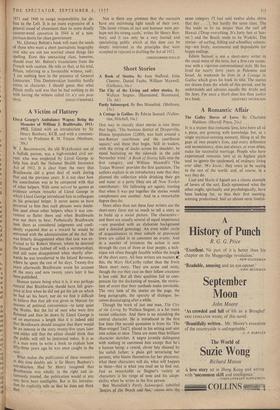Short Stories
A Book of Stories. By. Jean Stafford, John Cheever, Daniel Fuchs, William Maxwell. (Gollancz, 16s.) ONE way to classify short stories is into those that begin, 'The business district of Draperville, Illinois (population 12,000), was built around a neo-Roman courthouse and the courthouse square,' and those that begin, 'Still in .waders, with the string of ducks across his shoulder, he stood hesitating on the sidewalk in the cold November wind.' A Book of Stories falls into the first category, and William Maxwell's 'The Trojan Women' provides the first quotation. The authors explain in an introductory note that they planned the collection while drinking their gin and water at a party (they are all New Yorker contributors : life following art again), trusting that when it was put together the stories would complement one another. And to a remarkable degree they do.
More often than not these four writers use the short-story form not so much to tell a story as to build up a social picture. The characters— and there are usually several of equal importance —are provided with an elaborate background and a detailed genealogy. An even wider circle of acquaintances in their suburb or provincial town are called in to comment on events. And in a number of instances the action 'is seen through the eyes of three or four people, .a tech- nique not often thought feasible within the lengtk of the short story. All four writers are masters 14 this, the Mary McCarthy rather than the Irwin Shaw short story. They are acute and witty, though the eye they cast on their fellow creatures is less cold. But all their qualities fail to com- pensate for the slackening of tension, the restric- tion of event that their methods make inevitable. The very look of the stories on the page, the long paragraphs, the sparsity of dialogue, be- comes discouraging after a while.
Though the work of just one man, The City of the Living, by Wallace Stegner, is a far more varied collection. And there is no mistaking the central character. He is introduced in the first few lines (the second quotation is from his 'The Blue-winged Teal'), placed in his setting and sent into action at once. These are more than brilliant character sketches. A negro juvenile delinquent with nothing to commend him except that he's a human being; a cowed, clever boy shamed by his oafish father; a plain girl terrorising her parents, who blame themselves for her plainness; what these characters will do, what will happen to them—that is what you read on to find out. Just as remarkable as Stegner's variety of characters is his range of tone and his adapt- ability when he writes in the first person.
Ben Masselink's Partly Submerged, subtitled `Stories of the Beach and Sea,', comes into the
same category CI had sold twelve aloha shirts that day . .'), but hardly the same class. The Sea tends to be no deeper than the surf off Hawaii (`Drop everything. It's forty feet at Sun- set.') and the Beach tends to be Waikiki. The stories- -of surfing, fishing and schoolboy colonis- ing—are lively, sentimental and dependable for happy endings.
Edwin Samuel is not a short-story writer in the usual sense of the term, but a first-rate racon- teur with a vigorous conversational style. He has lived for nearly forty years in Palestine and Israel. At weekends he lives in A Cottage in Galilee which gives his book its title. The stories are drawn from the whole of this period, and he understands and admires equally the Arabs and the Jews. For once a blurb does less than justice
































 Previous page
Previous page